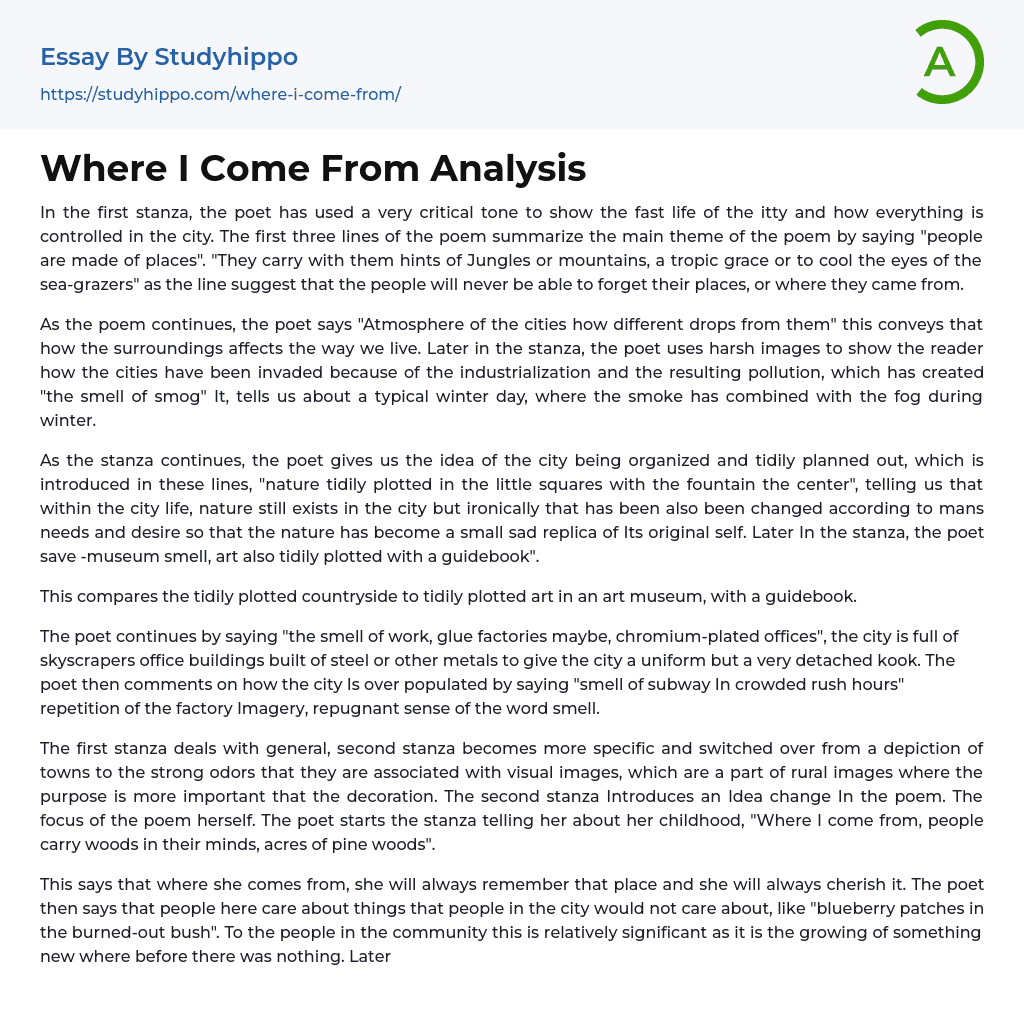In the first stanza, the poet has used a very critical tone to show the fast life of the itty and how everything is controlled in the city. The first three lines of the poem summarize the main theme of the poem by saying "people are made of places". "They carry with them hints of Jungles or mountains, a tropic grace or to cool the eyes of the sea-grazers" as the line suggest that the people will never be able to forget their places, or where they came from.
As the poem continues, the poet says "Atmosphere of the cities how different drops from them" this conveys that how the surroundings affects the way we live. Later in the stanza, the poet uses harsh images to show the reader how the cities have been invaded because of the industrialization and
...the resulting pollution, which has created "the smell of smog" It, tells us about a typical winter day, where the smoke has combined with the fog during winter.
As the stanza continues, the poet gives us the idea of the city being organized and tidily planned out, which is introduced in these lines, "nature tidily plotted in the little squares with the fountain the center", telling us that within the city life, nature still exists in the city but ironically that has been also been changed according to mans needs and desire so that the nature has become a small sad replica of Its original self. Later In the stanza, the poet save -museum smell, art also tidily plotted with a guidebook".
This compares the tidily plotted countryside to tidily plotted art in an
art museum, with a guidebook.
The poet continues by saying "the smell of work, glue factories maybe, chromium-plated offices", the city is full of skyscrapers office buildings built of steel or other metals to give the city a uniform but a very detached kook. The poet then comments on how the city Is over populated by saying "smell of subway In crowded rush hours" repetition of the factory Imagery, repugnant sense of the word smell.
The first stanza deals with general, second stanza becomes more specific and switched over from a depiction of towns to the strong odors that they are associated with visual images, which are a part of rural images where the purpose is more important that the decoration. The second stanza Introduces an Idea change In the poem. The focus of the poem herself. The poet starts the stanza telling her about her childhood, "Where I come from, people carry woods in their minds, acres of pine woods".
This says that where she comes from, she will always remember that place and she will always cherish it. The poet then says that people here care about things that people in the city would not care about, like "blueberry patches in the burned-out bush". To the people in the community this is relatively significant as it is the growing of something new where before there was nothing. Later in the stanza the poet says, "wooden farmhouses, old, in need of paint".
This is in direct contrast to the first stanza where everything is new and attractive.
As the stanza continues the poet portrays a farming life with the ideas of chickens and hens
kept in yards, generally used to provide a source of food in the form of eggs, or literally speaking the chickens themselves. The poet continues the stanza by saying, "The battered schoolhouse" again places emphasis on it being an old building remaining only for practical purposes and not bioengineering by a more attractive building. Enid which violets grow' Just backs up the earlier line of 'blueberry's growing in the burnt out bush', it shows how nature can create a picture of beauty anywhere, out of anything. The last stanza talks about how the poets past life has left a mark on her for the rest of her life, "A door in the mind blows open, and there blows a frosty wind from fields of snow', this signifies that the poet might be from a place where it is winter for the most of the year and whenever there would be a breeze of cold air, she would remember her past and this will always be her.
- Creativity essays
- Art History essays
- Theatre essays
- Pastoral essays
- Visual Arts essays
- Postmodernism essays
- Symbolism essays
- ballet essays
- Color essays
- Modernism essays
- Mona Lisa essays
- Work of art essays
- Body Art essays
- Artist essays
- Cultural Anthropology essays
- Ethnography essays
- Aesthetics essays
- Realism essays
- Heritage essays
- Harlem Renaissance essays
- Concert Review essays
- Voice essays
- Theatre Of The Absurd essays
- Playwright essays
- Scotland essays
- Tennessee williams essays
- Design essays
- Graffiti essays
- Graphic essays
- Typography essays
- Painting essays
- Photography essays
- Sculpture essays
- Architecture essays
- Interior design essays
- Arch essays
- Area essays
- Tattoo essays
- Pablo Picasso essays
- Vincent Van Gogh essays
- Michelangelo essays
- Frida Kahlo essays
- Classical Mechanics essays
- Rail Transport essays
- Tata Motors essays
- Vehicle Brands essays
- trucks essays
- Auto Racing essays
- Harley-Davidson essays
- Suzuki essays




